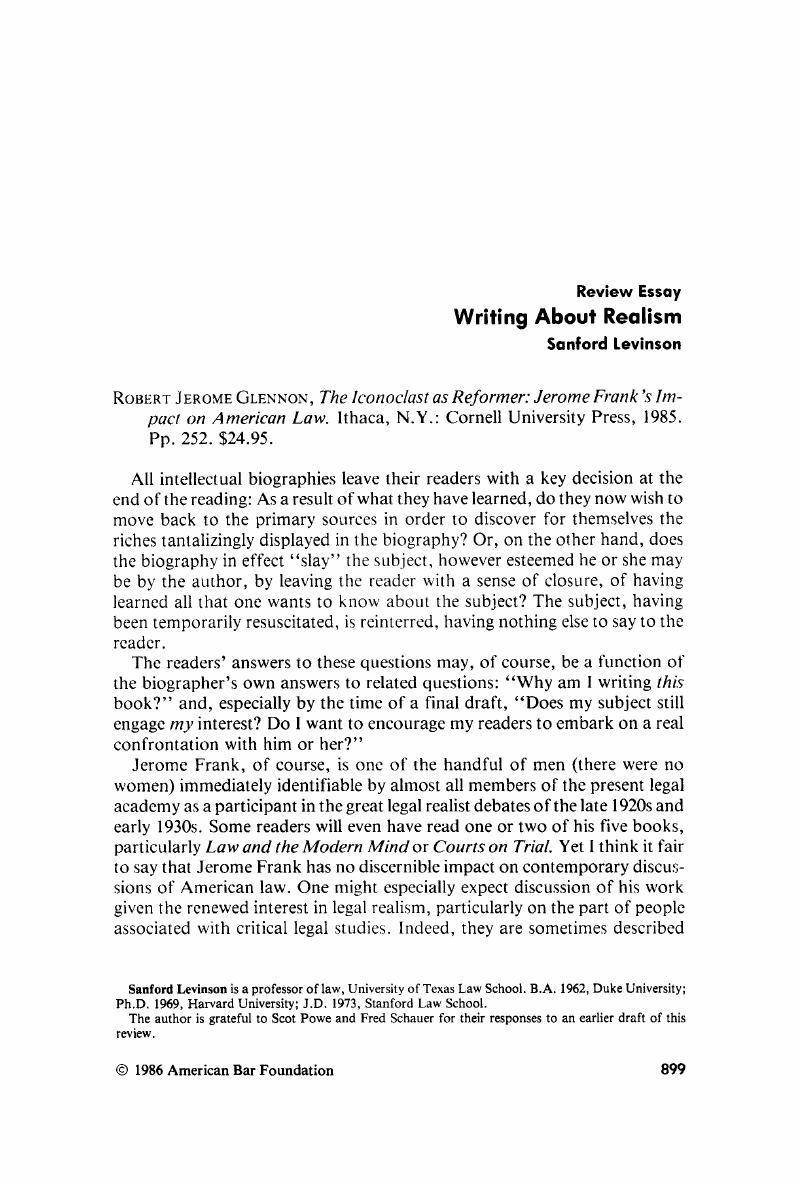Article contents
Writing About Realism
Published online by Cambridge University Press: 20 November 2018
Abstract

- Type
- Review Essays
- Information
- Copyright
- Copyright © American Bar Foundation, 1985
References
1 165 F.2d 152(2d Cir. 1947).Google Scholar
2 Insofar as Glennon's views are similar in important ways to those of Owen Fiss, see Objectivity and Interpretation, 34 Stan. L. Rev. 739 (1982); Conventionalism, 58 s. Cal. L. Rev. 177 (1985). My views can be found in Levinson, Law as Literature, 60 Tex. L. Rev. 373 (1982); and What Do Lawyers Know (and What Do They Do with Their Knowledge?), 58 S. Cal. L. Rev. 441 (1985). See also Singer, The Player and the Cards: Nihilism and Legal Theory, 94 Yale L.J. 1 (1984), which makes an important attempt to resolve the tensions that exist between the so-called indeterminacy thesis, with its emphasis on the malleability of doctrine, and the patent fact that most legal adepts can in fact engage relatively well in their Holmesian tasks of “predicting” the decisions of courts.Google Scholar
3 Shklar, J., Legalism: An Essay on Law, Morals, and Politics 98 (1964).Google Scholar
4 Frankfurter, Supreme Court, United States, 14 Encyc. Soc. Sci. 480 (1st ed. 1930).Google Scholar
5 See Singer, , supra note 2.Google Scholar
6 See, e.g., Marshall's famous (or notorious) denial of his own power as a judge:Google Scholar
Judicial power, as contradistinguished from the power of the laws, has no existence. Courts are the mere instruments of the law, and can will nothing. When they are said to exercise a discretion, it is a mere legal discretion. a discretion to be exercised in discerning the course prescribed by law; and, when that is discerned, it is the duty of the Court to follow it. Judicial power is never exercised for the purpose of giving effect to the will of the Judge: always for the purpose of giving effect to the will of the Legislature: or, in other words, to the will of the law.
Osborn v. Bank of the United States, 22 U.S. (9 Wheat.) 733, 866 (1824). I find it implausible that Marshall could have believed this. Even if he did, I certainly presume that no reader of this review takes this seriously as a description of Marshall's role in our history, i.e., as merely the impersonal messenger of “the will of the law.” And it is this latter point that is far more important. It is the sincerely embraced ideology that realism tries to describe and explain; the sincerity of a judge is a far less significant focus of attention.Google Scholar
7 Fong Foo v. Shaughnessy, 234 F.2d 715 (2d Cir. 1955).Google Scholar
8 221 F.2d 189, 206 (2d Cir. 1955).Google Scholar
- 1
- Cited by


